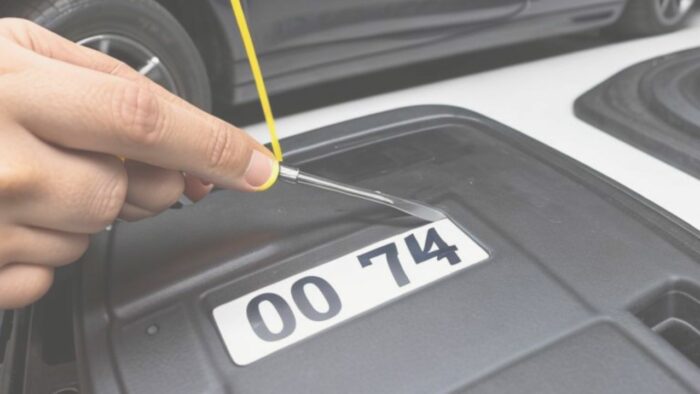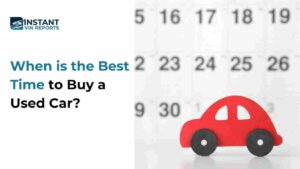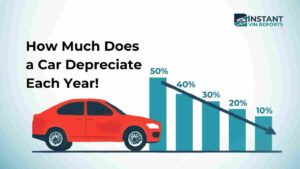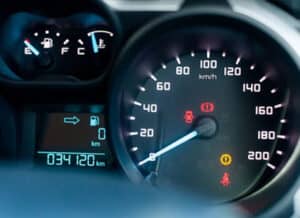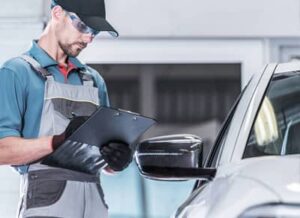If you are interested in selling your car or trading it in, then you must have thought about just how safe it is to put your VIN number out there for everyone to see. So, is it safe to share VIN numbers?
Yes, it is safe to share VIN numbers publicly, whether in public at dealerships, private sales, or online automotive marketplaces or classifieds.
In this blog, we will take a closer look at just how safe it is to share VIN numbers and explore the benefits it can bring.
Additionally, we will highlight the importance of utilizing reliable sources like Instant VIN Reports, a trusted provider of detailed and concise vehicle history reports, to promote transparency and trust in your car sale.
What is a VIN number?
Before we dive into further discussion on the topic “Is it safe to share VIN numbers?” Let’s take a look at the Vehicle Identification Number (VIN) itself.
When we understand what the VIN is and what it involves, we can understand that there are no threats to making your VIN available on public car marketplaces or local car sales. So what is a VIN number?
It is an alphanumeric code, between 5 to 17 digits, which is assigned to vehicles during manufacture and serves as a means of identification for each vehicle.
But that’s not all; it isn’t just a bunch of letters and numbers.
In the VIN are encoded the vehicle specifications, year of manufacture, make and model, among other details and with a VIN decoder such as the one provided by Instant VIN Reports, this information can be easily extracted.
Is it safe to share VIN numbers? Reasons why you should share your VIN
While there are car sellers out there with good vehicles and good intentions, there are others looking to sell damaged vehicles, leaving customers with the option to exercise caution and review each vehicle before purchase.
If you are a seller, providing the VIN Number of the vehicles you have for sale can be a good way of showing transparency during transactions.
This review and research process can be easily carried out by using the VIN. With this VIN and a good VIN check tool like the one provided by Instant VIN Reports, customers can gain access to the specifications, history, and records of their vehicles, such as:
- Accident history
- Damage records
- Vehicle specifications
- Service records
- OEM maintenance schedules
- Auction history with photos (if available)
- Sales history
- Ownership records
- Title brand records
- Open recalls
- Warranty information
- Theft records, and more.
If you are a car buyer or seller, ensure that a sale is not completed without a vehicle history report from Instant VIN Reports.
This way, buyers can make the best decisions and purchase reliable vehicles. What other benefits are there when a seller shares their VIN number?
Read also: How to get a Vehicle’s original window sticker by VIN
Benefits of sharing your VIN number
Enhancing trust and transparency in vehicle transactions
By sharing your VIN number with potential buyers or sellers, you promote transparency in the transaction.
It allows interested parties to access reliable information about the vehicle’s history and gain confidence in the purchase or sale.
Verified vehicle history reports
Sharing your VIN number enables access to detailed vehicle history reports, providing crucial insights into the vehicle’s past.
Instant VIN Reports specializes in compiling comprehensive reports that include accident history, maintenance records, previous ownership details, mileage validation, and more.
These reports can help buyers make informed decisions and ensure the integrity of the vehicle’s history.
Access to recall and safety information
Manufacturers often issue recalls to address safety-related defects or issues.
By sharing your VIN number, you can uncover data about any outstanding recalls for your vehicle.
This ensures that you stay informed and take the necessary actions to maintain your safety and the well-being of your vehicle.
Streamlined insurance and warranty services
Insurance providers and warranty companies may require your VIN number to offer accurate coverage and pricing.
Sharing this information can help streamline the process of obtaining insurance policies or extending warranty services, ensuring you receive suitable coverage for your vehicle.
Now that you can see why you should be sharing your VIN more, you should also be careful where you publicly display your VIN.
Let’s examine the safety of sharing your VIN number in the next section. Is it safe to share your car VIN number?
The safety of sharing your VIN number: Is it safe to share VIN numbers?
When it comes to the safety of sharing your VIN number, it’s important to understand that the VIN itself does not contain sensitive personal information.
It consists of alphanumeric characters that represent specific details about the vehicle, rather than personal identifiers.
However, it is still essential to exercise caution and consider potential risks when sharing your VIN number. One of such risks is VIN cloning.
What is VIN cloning?
According to Coalition Against Insurance Fraud, VIN cloning is a fraudulent practice where someone copies or “clones” a legitimate vehicle’s VIN and transfers it onto another vehicle that may be stolen or salvaged.
This illegal activity allows the criminal to give the stolen or salvaged vehicle the appearance of a legitimate one, making it easier to sell to unsuspecting buyers.
For car sellers, sharing your VINs with others is not a terrible idea, but it creates an opportunity for potential VIN cloning.
Criminals could obtain the visible VIN number and use it to create counterfeit documents and labels for a stolen or salvaged vehicle, then sell this damaged vehicle to unsuspecting buyers.
Here’s an overview of how the process of VIN cloning may occur:
- Visibility of the VIN: The seller inadvertently leaves their VIN visible or accessible, either through photographs posted online, documentation left in the vehicle, or even a physical label that is not adequately protected.
- VIN acquisition: A criminal identifies the visible VIN and copies it. This can be done by taking a photograph, writing down the number, or even taking out the VIN label from the original vehicle.
Application to another vehicle: The criminal finds a stolen or salvaged vehicle that closely matches the make and model of the legitimate vehicle. They remove the existing VIN and replace it with the cloned one obtained from the seller. - Creation of fraudulent documents: The criminal proceeds to create counterfeit documents, such as a title or registration, using the cloned VIN. They may forge these documents to make the stolen or salvaged vehicle appear legitimate.
- Sale to unsuspecting buyers: With the cloned VIN and fraudulent documents, the criminal markets the stolen or salvaged vehicle as a genuine one, typically at a lower price, to attract buyers. With prices that are too good to be true, unsuspecting individuals may get caught in their web and purchase these damaged or salvage-titled vehicles without realizing their true history.
This practice of VIN cloning not only deceives buyers but also places the original vehicle owner at risk.
If the cloned vehicle is involved in criminal activities or accidents, the investigations may initially trace back to the original owner whose VIN was cloned.
This can lead to legal complications, financial burdens, and damage to the owner’s vehicle reputation.
With all this said, is it safe to share VIN numbers? Yes! It’s still considered safe to share your VIN number.
However, we would like to recommend that you exercise caution and share with just the right people.
ALSO READ: How to Check Market Value of Salvage Cars
Responsible Sharing Practices: Who are the "right people" to share my VIN with?
While sharing your VIN number is generally safe, it is crucial to exercise responsible sharing practices to mitigate potential risks. Here are some tips to consider:
- Share your VIN number only with trusted entities, such as potential buyers or legitimate vehicle service providers.
- Be cautious when sharing your VIN number online, and ensure the platform or website has secure data protection measures in place.
- Keep your devices and software up-to-date to safeguard against potential security vulnerabilities.
Sharing your VIN number can be done safely and brings numerous benefits when conducted responsibly.
It enables trust and transparency in vehicle transactions, provides access to comprehensive vehicle history reports and recall information, and streamlines insurance and warranty services.
Remember to exercise caution and share your VIN number only with trusted entities to avoid VIN cloning and other illegal activities.
When seeking detailed and concise vehicle history reports, rely on reputable providers like Instant VIN Reports to ensure accurate and reliable information.
Frequently Asked Questions
Yes, it is generally okay to share a VIN number. The VIN number itself does not typically contain sensitive personal information and primarily provides details about the vehicle’s specifications and history.
However, it is important to exercise caution and share your VIN number only with trusted entities or legitimate service providers.
Your VIN number provides essential information about your vehicle, including the manufacturer, make, model, year of production, manufacturing plant, and unique identification details.
It does not typically contain personal information but offers valuable insights into the vehicle’s history, specifications, and relevant details for identification purposes.
A car’s VIN number is a 17-character (or less in classic cars) alphanumeric code.
It consists of a combination of letters and numbers and is usually displayed on the vehicle’s dashboard, near the windshield, and on other parts such as the engine block or door frame.
The specific structure and arrangement of the characters may vary slightly depending on the manufacturer, but the VIN number is typically standardized across the automotive industry.
Sharing your VIN number is generally safe, as the VIN itself does not typically contain sensitive personal information.
However, it is important to exercise caution and share your VIN number only with trusted entities or legitimate service providers.
Be mindful of where and with whom you share this information to minimize potential risks.
Yes, it is generally safe to share the VIN number of your car. The VIN primarily provides information about the vehicle’s specifications and history.
However, ensure that you are sharing it with trusted entities or legitimate service providers to maintain privacy and minimize the risk of fraud or unauthorized access to your vehicle data.


